Jump to topic
Search
Program Details
The goal of the General Surgery Residency is to provide the highest level of training to develop leaders in the practice of clinical and academic surgery. The program provides the opportunity for residents to learn in-depth the fundamentals of basic science as they are applied to clinical surgery, while also learning the surgical skills necessary to undertake the most complex and demanding surgical conditions.
The program provides outstanding experience in the preoperative, operative and postoperative care of patients in all areas that constitute the essential components of general surgery as specified by the ACGME and Surgical Review.
Through rotations at Penn State Health Milton S. Hershey Medical Center, Penn State Health Children’s Hospital, Hampden Medical Center, Lancaster Medical Center and UPMC Pinnacle Community Osteopathic, residents are exposed to the entire spectrum of general surgery, from a community hospital setting to a large quaternary referral and Level I Trauma Center.
The fully accredited program is approved to graduate five chief residents in general surgery per year. The first two years of the program are designed to provide a core experience in the principal components of general surgery and the surgical subspecialities. After the second year, many residents choose to pursue two years of additional training in areas such as basic science research, surgical education or health care delivery and outcomes research. Laboratory experience of two years is encouraged and available to those who wish to pursue an academic career. The third through fifth years of training are to provide an in-depth experience in trauma, acute care surgery, surgical oncology, endocrine surgery, minimally invasive surgery, vascular surgery, general surgery, colon and rectal surgery and pediatric surgery.
The entire process provides a broad-based and well-balanced experience in surgery that allows graduates to be well-qualified to practice general surgery or pursue advanced training in various fellowships. Residents are well prepared for subsequent career paths in either academic or private-practice settings.
The program’s educational component is robust and offers each resident an extensive experience in didactic learning, surgical skills development and simulation training. In addition to weekly lectures by attendings, the program also utilizes weekly conferences, specialized small group sessions and one-on-one mentoring. Through the Clinical Simulation Center, residents have the opportunity to train on the latest in laparoscopic and clinical training simulators, to practice their surgical skills through biologic and inanimate training sessions and to develop their team skills while participating in crisis resource management clinical scenarios.
The Simulation Center is a Level I American College of Surgeons (ACS) Accredited Education Institute as well as a Fundamentals of Laparoscopic Surgery (FLS) and Fundamental of Endoscopic Surgery (FES) approved test site.
In addition to the basic and clinical sciences, the program has incorporated topics such as ethics and residents as teachers into its curriculum.
Up to five individuals are selected as categorical general surgery residents, and up to 12 are selected for the non-designated preliminary track. Residents from other surgical specialties also participate in the PGY-1 year, including Otolaryngology – Head and Neck Surgery, Orthopaedic Surgery, Plastic Surgery and Urology.
Three weeks of vacation are assigned throughout the year. In-house on-call responsibilities average every fourth to fifth night. There is a night-float rotation covering the core surgical disciplines.
Learn More about the Residency
Military match: Please contact GenSurgResidency@pennstatehealth.psu.edu for additional information on how to apply.
- Our interviews will be held virtually. We will offer interviews on Sept. 17 and 25.
NRMP match: The program uses ERAS (the Electronic Residency Application Service) for recruitment and match.
Our program will be following the recommendations of the APDS Task Force for the 2024-2025 application cycle.
- We will release our first round of interview invitations during the time period of Oct. 23, 2024, to Oct. 31, 2024.
- We will offer the same number of interviews as interview slots available.
- Our interviews will be held virtually. We will offer two interview dates: Nov. 20 and Dec. 12. We will also have a virtual social gathering the night before each interview date. This social gathering gives the applicants the opportunity to meet the residents in a relaxed atmosphere.
There are several services on which residents rotate during the five clinical years, all with multiple attendings.
- The vascular service; there is also a Vascular Surgery Residency.
- The surgical oncology service.
- The minimally invasive/bariatric surgery service, which includes more advanced laparoscopic procedures and which also supports a Minimally Invasive and Bariatric Surgery Fellowship.
- The trauma, acute care and critical care surgery service, which accepts all trauma and acute care surgical patients. This group also supports a Trauma and Acute Care Surgery Fellowship and a Surgical Critical Care Fellowship.
- The thoracic surgery service, which supports a Thoracic Surgery Fellowship.
- The pediatric surgery service, which is busy and active, serving all of mid-state Pennsylvania.
- The general surgery/endocrine service.
- The colon and rectal surgery service, which supports a Colon and Rectal Surgery Residency.
Virtual Tour
Penn State Health
Penn State Health is an integrated academic health system serving patients and communities across 15 counties in central Pennsylvania. It employs more than 20,900 people systemwide.
The system includes Penn State Health Milton S. Hershey Medical Center, Penn State Health Children’s Hospital and Penn State Cancer Institute based in Hershey, Pa.; Penn State Health Hampden Medical Center in Enola, Pa.; Penn State Health Holy Spirit Medical Center in Camp Hill, Pa.; Penn State Health Lancaster Medical Center in Lancaster, Pa.; Penn State Health St. Joseph Medical Center in Reading, Pa.; Pennsylvania Psychiatric Institute, a specialty provider of inpatient and outpatient behavioral health services, in Harrisburg, Pa.; and 2,417 physicians and direct care providers at 225 outpatient practices. Additionally, the system jointly operates various healthcare providers, including Penn State Health Rehabilitation Hospital, Hershey Outpatient Surgery Center and Hershey Endoscopy Center.
In 2017, Penn State Health partnered with Highmark Health to facilitate creation of a value-based, community care network in the region.
Penn State Health shares an integrated strategic plan and operations with Penn State College of Medicine, the University’s medical school. With campuses in State College and Hershey, Pa., the College of Medicine boasts a portfolio of more than $150 million in funded research and more than 1,700 students and trainees in medicine, nursing, other health professions and biomedical research.
Learn more about Penn State Health
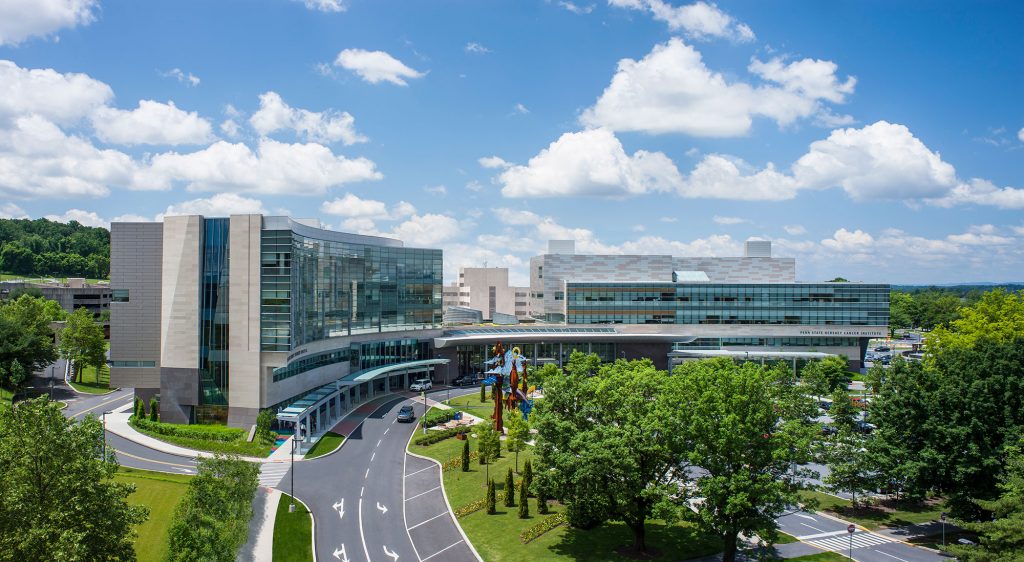
Penn State Health Children’s Hospital (left), Penn State Health Milton S. Hershey Medical Center (center) and Penn State Cancer Institute (right)
Penn State Health Milton S. Hershey Medical Center
500 University Dr., Hershey, Pa., 17033 (Derry Township, Dauphin County)
- The health system’s 611-bed flagship teaching and research hospital
- The only medical facility in Pennsylvania accredited as both an adult and a pediatric Level I (highest-level) trauma center
- Dedicated surgical, neuroscience, cardiovascular, trauma and medical intensive care units
- Accredited Life Lion critical-care transport providing more than 1,100 helicopter and approximately 750 ground ambulance transports per year
- More than 1,300 faculty members and more than 650 residents and fellows
- Approximately 29,000 admissions, 73,000 emergency department visits, 1.1 million outpatient visits and 33,000 surgical procedures annually
- Designated as a Magnet hospital since 2007
Learn more about Milton S. Hershey Medical Center
Penn State Health Children’s Hospital
600 University Dr., Hershey, Pa. 17033 (Derry Township, Dauphin County)
- An eight-story, 263,000-square-foot-facility built in 2013 and expanded in 2020
- 160 licensed pediatric beds, 26-bed pediatric intensive care unit and a 56-bed neonatal intensive care unit
- Level IV (highest-level) neonatal intensive care unit
- Level I quaternary (highest-level) pediatric intensive care unit
- Level I (highest-level) pediatric trauma center designation
- Intermediate care unit
- Dedicated pediatric operating rooms
- More than 150,000 pediatric outpatient visits, 20,000 pediatric emergency room visits, and approximately 5,000 pediatric patient discharges annually
Learn more about Penn State Health Children’s Hospital
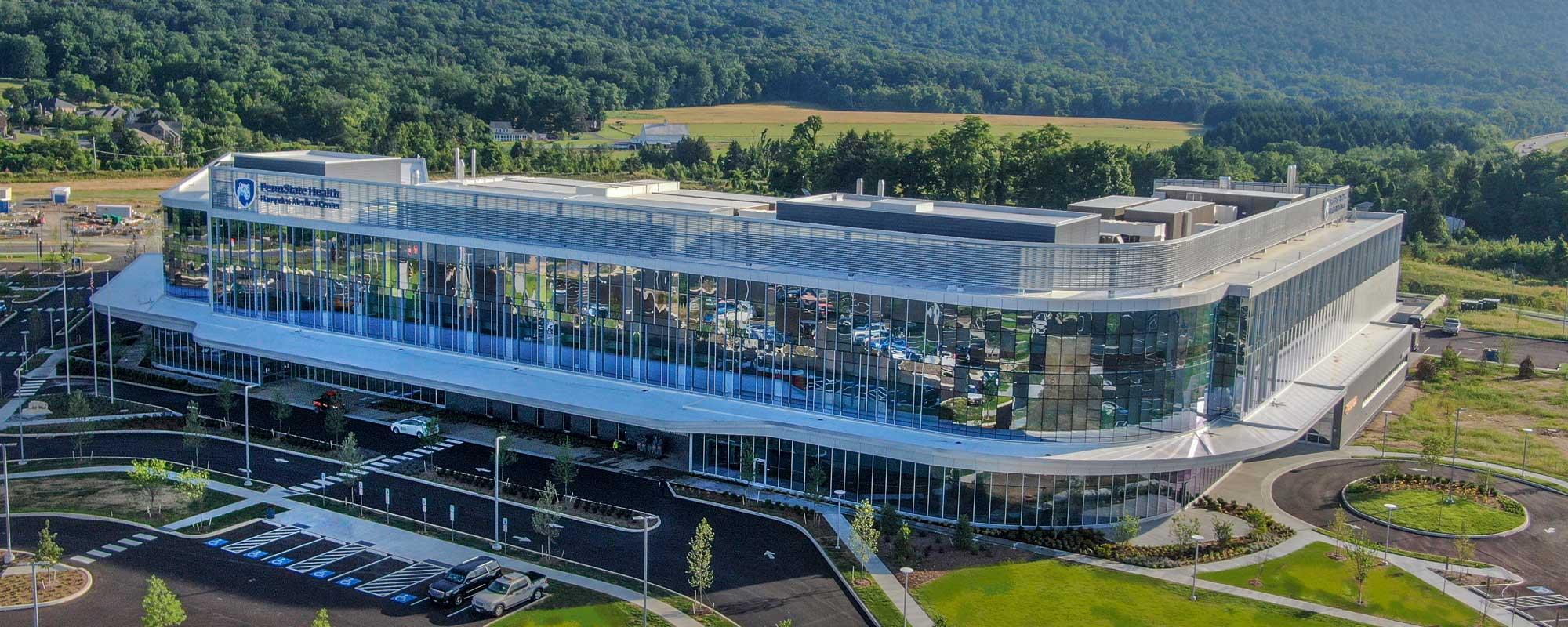
Hampden Medical Center
Penn State Health Hampden Medical Center
2200 Good Hope Road, Enola, Pa., 17025 (Hampden Township, Cumberland County)
- 120-private-inpatient-bed hospital on the West Shore that opened to patients in October 2021
- Three-story, 300,000-square-foot facility designed to provide acute care and outpatient services
- Provides expert 24/7 emergency medical care, inpatient and outpatient medical and surgical care, and labor and delivery services (opening in late 2021)
Learn more about Hampden Medical Center
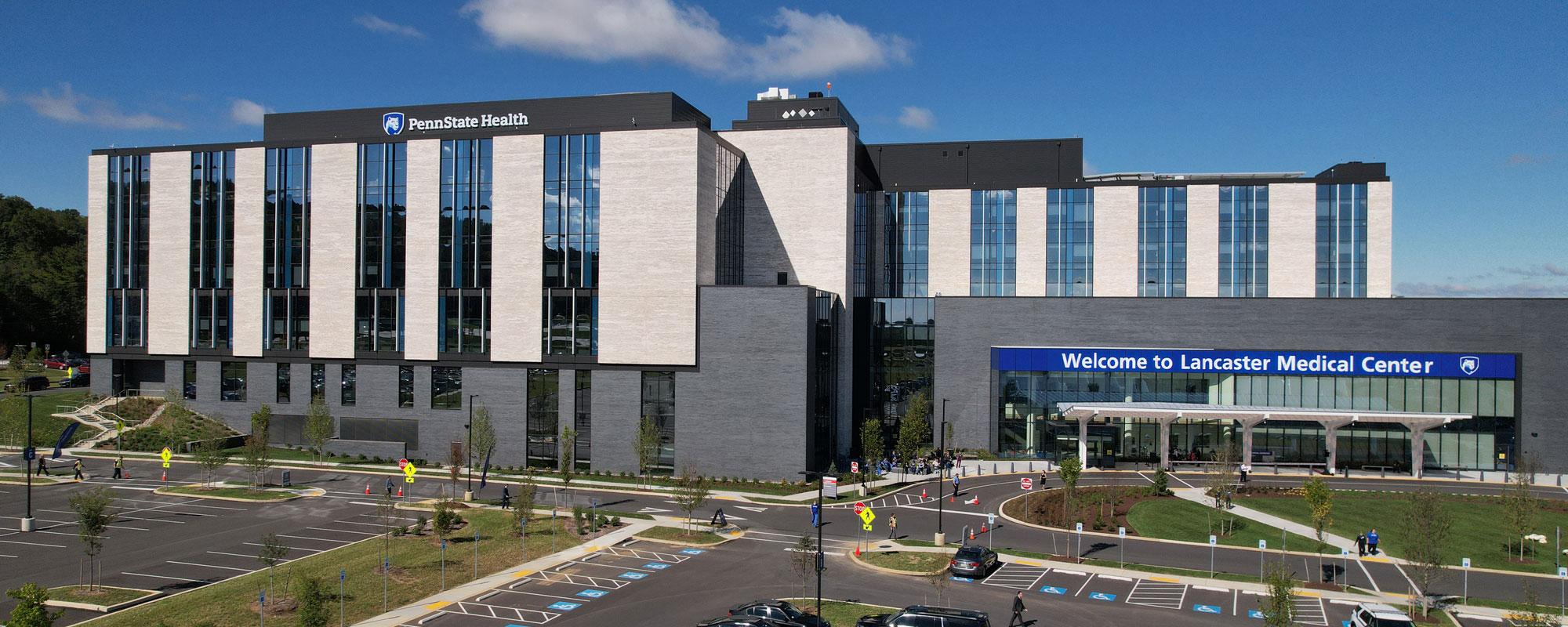
Lancaster Medical Center
Penn State Health Lancaster Medical Center
2160 State Rd., Lancaster, Pa. 17601 (East Hempfield Township, Lancaster County)
- 142-bed community hospital that opened its doors to patients in October 2022
- Provides acute and specialty care services
- Features an emergency department, specialty medical and surgical services, labor and delivery, an imaging lab and an attached medical office building for physician practices and outpatient services
Welcome to Hershey
More About Hershey
Interested in learning more about living and working in Hershey, Pa.? See details here:
Wellness, including emotional, spiritual, social and physical health, is a crucial component to training and to becoming a professional, compassionate and resilient physician. Self-care is a skill which must be continually practiced and reinforced. Penn State College of Medicine and Penn State Health are committed to addressing wellness among residents and fellows, with multiple resources readily available.
Institutional resources
- Visit BeWell – a health program designed to support Penn State Health employees
- See Penn State College of Medicine wellness resources here
- Employee Health Care Concierge and Case Management Service
- Partners in Medicine
Moving to a new city with your family does not have to be stressful. Residency programs have assisted many significant others with finding employment. There is also a GME-Wide Partners in Medicine (PIM) group that offers networking opportunities as well as various social and community oriented activities. - The Doctors Kienle Center for Humanistic Medicine
- Active and easily accessed Office of Professional Mental Health
Graduate medical education resources
Institutional Resources
Penn State Health and Penn State College of Medicine celebrate, embrace and support the diversity of all patients, faculty, staff, students and trainees.
Office for Diversity, Equity and Inclusion
In keeping with this, Penn State Health has an active Office for Diversity, Equity and Inclusion with various programs, networks and resource groups, including:
- Talks and lectures on diversity, equity and inclusion through the Inclusion Academy
- Regular events on topics such as eradicating racism and creating a culture of inclusiveness
- Many Business Employee Resource Groups (BERGs), including:
- Disability Business Employee Resource Group
- Interfaith Business Employee Resource Group
- LGBTQ+ Business Employee Resource Group
- Military and Veterans Business Employee Resource Group
- Multicultural Business Employee Resource Group
- NextGen Business Employee Resource Group
- Black Physician Professional Staff Association – Resource Group
- Hispanic Professional Association
- Asian Physician and Professional Staff Association
- International Workforce Inclusion
- Inclusion Academy
Learn more about the Penn State Health Office for Diversity, Equity and Inclusion
Learn more about the College of Medicine’s Office for Diversity, Equity and Belonging
Office for Culturally Responsive Health Care Education
The vision at Penn State College of Medicine and Penn State Health is to equip learners with the knowledge, skills and attitudes they will need to provide culturally excellent health care and research for an increasingly diverse U.S. population. The Office for Culturally Responsive Health Care Education was formed to help meet that goal.
Learn more about the Office for Culturally Responsive Health Care Education
Office for a Respectful Learning Environment
In addition, the institution does not tolerate discrimination, biases, microaggression, harassment or learner mistreatment of any kind, and any concerns are immediately addressed by the Office for a Respectful Learning Environment.
Learn more about the Office for a Respectful Learning Environment
Network of Under-represented Residents and Fellows
The Network of Under-represented Residents and Fellows (NURF) is a group of diverse residents and fellows representing all specialties. NURF’s goal is to promote cultural diversity in the residency programs through community involvement, mentorship with diverse faculty, professional networking and support for the recruitment of diverse medical students into the residency programs.
NURF is sponsored by the Penn State College of Medicine Graduate Medical Education Office and the Penn State Health Office for Diversity, Equity and Inclusion.
Learn more information about NURF
Departmental Resources
Penn State’s Department of Surgery is committed to high quality in patient care and in the education of medical students, residents and other trainees, and to maintaining an inclusive environment that fosters the development of all faculty and staff.
As such, the department has created a Statement on Diversity that maps out its goals and approaches to an inclusive environment.
Mailing Address
Penn State Health Milton S. Hershey Medical Center
Department of Surgery
General Surgery Residency
500 University Dr.
MC H159
Hershey, PA 17033
Curriculum Details
Overall Training Program
The General Surgery Residency is structured to provide residents with graduated responsibilities in the primary components of general surgery over five years of training. Each year is constructed to build on the experiences of the preceding level.
The core curriculum in general surgery is designed to provide residents with a strong knowledge base in the fundamentals of diagnosis and treatment of surgical diseases. The overall schedule is structured on SCORE (Surgical Council on Resident Education) and is on a two-year cycle. The curriculum is highly integrated with didactic sessions, case-based learning lectures, surgical techniques and skills sessions. Skills based learning occurs in both dry and wet lab settings. ABSITE preparation is supplemented with a subscription to TrueLearn.
Three hours of protected time every Thursday morning are devoted to education with dedicated intern education every Tuesday morning. Each Thursday morning generally consists of a one-hour lecture on a SCORE-based topic. The subsequent two hours may then be spent in case-based learning, small group seminars and simulation skills sessions.
The overall objective is to develop residents through in-depth experience in managing surgical patients in a variety of situations and disciplines while developing basic surgical technical skills.
First and Second Years
The first and second years of the General Surgery Residency are designed to provide the individual with the experience necessary to develop a foundation in the core components of general surgery and the surgery subspecialties.
The first-year resident has primary responsibility for directing the pre-and postoperative care of patients in the inpatient and outpatient settings under the direct supervision of a senior resident and attending surgeon. These responsibilities include history and physical examinations, daily management of inpatient service and participation in approved-level surgical presentations.
Throughout the year, there are also separate intern didactic and skills sessions to allow the first-year residents to further develop and practice basic surgical techniques and procedures.
The second year builds on these experiences while introducing the responsibilities of surgical consultation.
Third through Fifth Years
In the third through fifth years, the focus transitions to increasing operative skills and service leadership. Protected time on Thursday mornings includes mock oral examinations, descriptions of more complex operations and pathologies, and teaching junior residents.
Penn State Health, Penn State Health Milton S. Hershey Medical Center and Penn State Children’s Hospital
Learn more about the health system and hospitals here.
UPMC Pinnacle Community Osteopathic
UPMC Pinnacle Community Osteopathic is located off Union Deposit Road in suburban Harrisburg, Pa., approximately 20 minutes from Hershey. The Osteopathic campus includes an acute-care hospital, medical sciences pavilion, cancer center, outpatient center and multiple physician practices and specialty offices.
There are three mandatory conferences for the General Surgery Residency: division-specific conferences, Thursday morning education conferences and Tuesday morning intern education.
Morbidity and Mortality Conference
Morbidity and Mortality Conference occurs at 7 a.m. Thursdays. Residents are responsible for presenting cases that are chosen for their educational and management learning points. The assigned resident is expected to develop a PowerPoint presentation and to review it with the responsible attending prior to the conference.
Grand Rounds Conferences
Grand Rounds with visiting professors occur at 5 p.m. every other Thursday, September through June.
Journal Club
Journal Club takes place throughout the academic year and is incorporated with a resident-faculty evening event.
Division-Specific Conferences
Many divisions have their own specialty-based conferences. A representative schedule may include the following:
- Colon and rectal surgery
- Minimally invasive and bariatric surgery
- Pediatric surgery
- Plastic surgery
- Surgical oncology
- Trauma/critical care
- Vascular surgery
Career Development in Research
The Department of Surgery has a broad research program, and all divisions maintain active basic research labs or clinical research labs.
As part of an academic institution, the expectation is that most, if not all, of the surgical residents will spend a two-year period immersed in basic science or clinical research.
Prospective residents should expect to spend two years pursuing career development in research that helps to better prepare them for their future medical careers.
Current and past residents have taken the opportunity to pursue advanced degrees during this time period, and the opportunity exists to complete a number of master’s degree programs through Penn State or Penn State World Campus.
Residents have also participated in laboratories outside of the department, both within Penn State College of Medicine and other institutions, including the National Institutes of Health, returning after their career-development years to resume clinical training in Hershey.
While residents are encouraged to pursue external funding sources, limited support is available through the Department of Surgery for qualified individuals and projects.
Learn More About Research
- Research in the Department of Surgery
- Research in the Department of Biochemistry and Molecular Biology
- Research in the Department of Cellular and Molecular Physiology
Degree Programs
The possibility of pursuing an advanced degree in a number of areas within the Penn State system exists during the two years of career development between the second and third clinical years. Degrees available include:
- Master of Education
- Master of Business Administration
- Master of Science
- Master of Public Health
- Master of Health Administration
Mission
The mission of the Penn State Health Global Surgery Program is accomplished through the mission objectives. In addition to the research objective, the program also seeks to provide training and mentorship in global surgery for staff, residents, fellows and medical students. The purpose of the training is to develop future leaders in global surgery that will have the skills to continue working abroad, as well as at home, to increase health and prosperity around the globe. The assets available at Penn State Health Milton S. Hershey Medical Center provide a world-class foundation in humanitarian health care, medical health systems and global medical ethics.
Vision
The program’s vision is to educate future leaders in global surgery while promoting positive changes in accessing and providing essential surgical care. The central focus of the program is to address the burden of surgical disease in impoverished areas through research, innovation and sustained collaboration with host nation partners.
Understanding the epidemiology of surgical diseases in low-resource countries requires an understanding of the local environment as well as precise data collection. This can best be accomplished by working alongside clinicians overseas and developing processes that identify the host nation’s surgical priorities. These data will be used to find innovative solutions to medical problems, identify priorities for translational research and provide opportunities to increase the research infrastructure within the host nations.
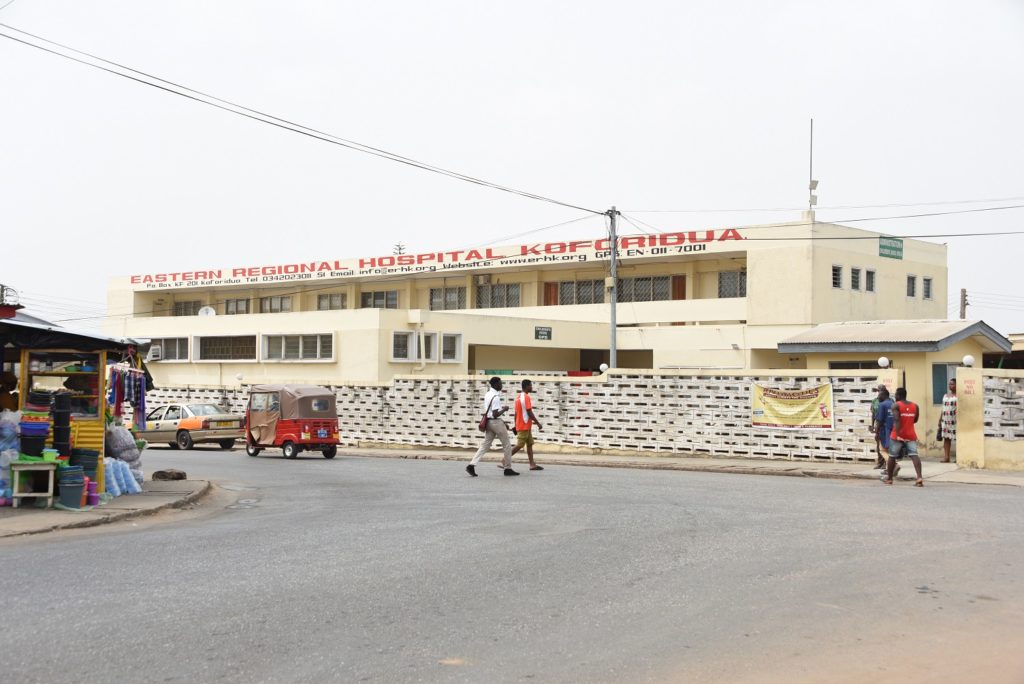
Eastern Regional Hospital Koforidua in Ghana is one of the sites for the Global Surgery program.
Objectives
- Increase surgical capacity in low- and middle-income countries.
- Conduct novel research in low resource settings to identify the epidemiology of surgical diseases in impoverished areas and barriers to accessing safe surgical care.
- Provide mentorship in global surgery for residents, fellows and medical students in order to prepare them for service in low-resource settings.
- Embody the core values of Penn State Health Milton S. Hershey Medical Center – respect, integrity, teamwork and excellence – in the practice of global surgery.
Global Surgery Team
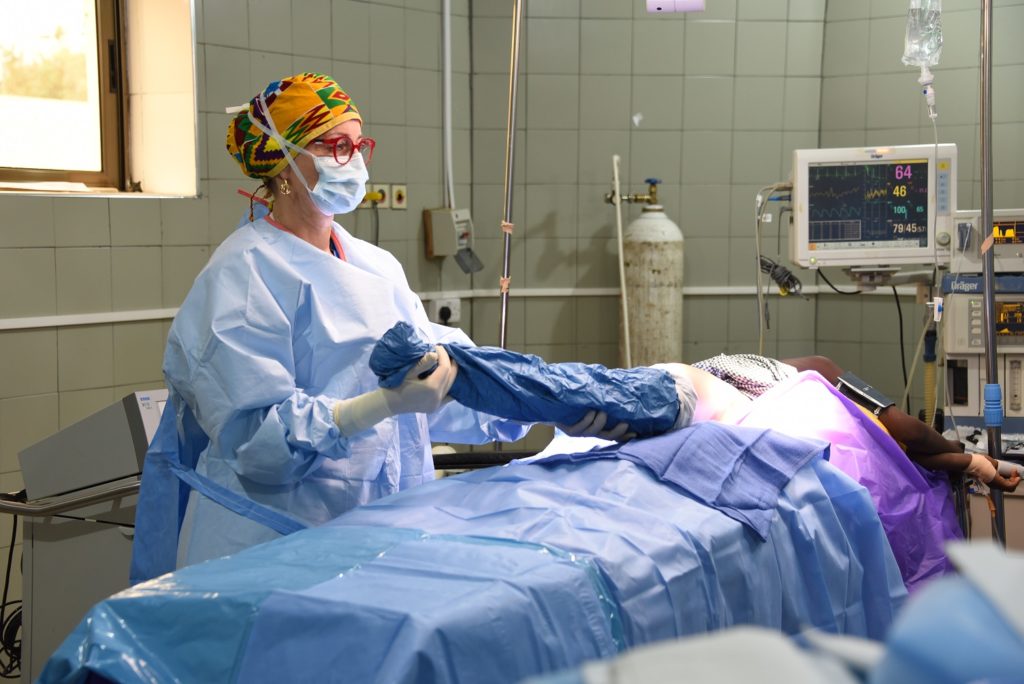
Dr. Daleela Dodge is seen in the operating room during a Global Surgery trip to Ghana in January 2020.
Resident Honors and Recognitions
General Surgery Residency trainees have presented both podium and poster presentations at many conferences, including:
- AAMC Integrated Quality Meeting
- Abdominal Wall Reconstruction Summit
- Academic Surgical Congress (Society of University Surgeons)
- ACGME Annual Education Conference and ACGME-CLER (Clinical Learning Environment Review) Conference
- Advances in Inflammatory Bowel Disease Crohn’s and Colitis Foundations’ Clinical and Research Conference
- American Association of Thoracic Surgeons American College of Surgeons
- American College of Surgeons National Surgical Quality Improvement Program National Conference
- American Diabetes Association Scientific Sessions
- American Head and Neck Society (AHNS) International Conference on Head and Neck Cancer
- American Heart Association Americas Hepato-Pancreato-Biliary
- Association American Professional Wound Care Association Meeting
- American Society for Clinical Pathology Annual Meeting
- American Society of Anesthesiologists Annual Meeting
- American Society of Colon and Rectal Surgeons Annual Meeting
- American Society of Bariatric and Minimally Invasive Surgeons
- Annual Conference on Shock
- Annual Congress of American Hepato Pancreato Biliary Association
- Annual Hernia Repair Symposium
- Annual Meeting of the American Association for the Surgery of Trauma
- Annual Meeting of the Vascular and Endovascular Surgery Society
- Annual Metabolic Diseases World Summit
- Annual Research Conference on Food, Nutrition, Physical Activity and Cancer
- Association for Academic Surgery-Annual Academic Surgical Congress
- Association for Surgical Education
- Biological and Medical Data Analysis, International Symposium
- Canadian Association of Pediatric Surgeons Annual Meeting
- Central Surgical Association
- Clinical Robotic Surgery Association Worldwide Congress
- Clinical Meeting of the Frederick A. Coller Surgical Society
- Crohn’s and Colitis Foundation of America Conference
- Design of Medical Devices Conference
- Digestive Disease Week ESMO World Congress on Gastrointestinal Cancer
- European Society of Gene & Cell Therapy
- Experimental Biology
- Gastrointestinal Cancers Symposium
- Human Factors and Ergonomics Society Annual Meeting
- International Conference on Na,K-ATPase and Related Cation Pumps
- International Design Engineering Technical Conferences and Computers and Information in Engineering Conference
- International Pediatric Endosurgery Group Annual Congress
- Keystone American College of Surgeons
- Minimally Invasive Surgery Week
- Northeastern Society of Plastic Surgeons
- Pediatric Trauma Society Annual Meeting
- Penn State Health Milton S. Hershey Medical Center Grand Rounds
- Pennsylvania Colon and Rectal Society
- Pennsylvania Society of Bariatric Surgery
- Regional Cancer Therapies
- SAGES
- Sanctuary of Endovascular Therapy Meeting
- Society for Neuroscience Annual Meeting
- Society for Vascular Ultrasound Annual Conference
- Society of Laparoendoscopic Surgeons Minimally Invasive Surgery Week
- Society of Plastic Surgeons Annual Meeting
- Society of Surgical Oncology Annual Cancer Symposium
- Surgical Education Week
- The Society for Surgery of the Alimentary Tract
- Western Thoracic Surgical Association
- World Conference for Abdominal Wall Hernia Surgery
- World Congress of Endoscopic Surgery
- World Congress on Health Economics
Penn State College of Medicine and Penn State Health Milton S. Hershey Medical Center accept ongoing nominations for the Exceptional Moments in Teaching award.
The award, given monthly by the Office for a Respectful Learning Environment, accepts nominations from College of Medicine students who are invited to submit narratives about faculty members, residents, fellows, nurses or any other educators who challenge them and provide an exceptional learning experience. See more about the award here.
Previous nominees from the General Surgery Residency are listed here. Click the + next to a nominee name to read their nominator’s comments.
General Surgery Residency trainees have published in many journals and written book chapters, including items for:
- American Journal of Surgery
- American Journal of Physiology
- Anatomical Record
- Annals of Surgery
- Annals of Surgical Oncology
- Annals of Vascular Surgery
- Archives of Surgery
- Bioactive Materials
- Biochemistry
- Biomolecules
- Bulletin of the American College of Surgeons
- Cancer
- Clinical Oncology in Adolescents and Young Adults
- Clinical Radiology
- Colorectal Disease
- Critical Care Medicine
- Diseases of the Colon and Rectum
- Digestive Diseases and Sciences
- Endocrinology
- Endoscopy
- Fertility and Sterility
- Frontiers in Microbiology
- Gastric Cancer
- Gastrointestinal Endoscopy
- Health Services Insights Hernia : The Journal of Hernias and Abdominal Wall Surgery
- International Journal of Clinical and Experimental Medicine
- International Journal of Surgical Pathology
- Journal of Arthroplasty
- Journal of Crohn’s and Colitis
- Journal of Clinical Oncology
- Journal of Emergency Medicine
- Journal of Gastrointestinal Surgery
- Journal of Neurosurgery
- Journal of Pediatric Gastroenterology and Nutrition
- Journal of Pediatric Surgery
- Journal of Plastics and Reconstructive Surgery
- Journal of Reproductive Immunology
- Journal of Robotic Surgery
- Journal of Surgical Research
- Journal of Surgical Oncology
- Journal of Thoracic and Cardiovascular Surgery
- Journal of the American College of Surgeons
- Journal of the American Medical Association (JAMA)
- Journal of the CardioMetabolic Syndrome
- Journal of the Society of Laparoendoscopic Surgeons
- Journal of Trauma
- Microscopy Research and Technique
- Obesity
- Oncology Reports
- Pediatric Emergency Care
- Pediatric Radiology
- Surgery
- Surgical Endoscopy
- The American Surgeon
- The Breast Journal
- World Journal of Emergency General Surgery
- World Journal of Gastrointestinal Endoscopy
The annual Resident/Fellow Research Day is held each year (with exception of during the COVID-19 pandemic) on and around the Penn State Health Milton S. Hershey Medical Center campus.
The intent of the event is to provide an opportunity for residents and fellows to showcase their research accomplishments to their peers in other clinical departments, as well as their colleagues in the basic sciences.
Learn more about Resident/Fellow Research Day here.
Previous presentations from the General Surgery Residency are listed here.
Latest News from Surgery









